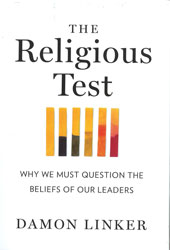
Published by W. W. Norton and Company
2010 , RRP $32.95
New York and London
Reviewed by Bruce Upham.
This is an absorbing book, quite apart from the main topic indicated in the title, with vivid descriptions of two minority groups we do not encounter in Australia — the Amish communities and an ultra-conservative group of Orthodox Jews, both successfully isolating themselves from the mainstream of American life.
The book deals with the situation in the United States, very different from ours in Australia, yet with similarities, and the issue it raises also applies here.
The U.S. Constitution explicitly states that ‘no religious Test shall ever be required as a Qualification to any Office or public Trust under the United States’.
That doesn’t mean that voters mustn’t take it into account.
John Kennedy, a Catholic, had to overcome hesitancy in the Democratic Party before he gained acceptance as their candidate for the Presidency, in a predominantly Protestant nation.
He went on to win the election.
As Mr Linker points out, however, in the decades since Mr Kennedy, fundamentalist Protestants with strong views have come to the fore, the “religious right”, and the earlier liberal attitudes have receded.
It may no longer be possible for a Catholic to prevail.
In Australia, the Commonwealth constitution guarantees religious freedom, with all citizens free to practise any or no religion.
Of our present leaders, Julia Gillard professes no religious beliefs publicly, Tony Abbot is a professed Catholic and Kevin Rudd is a practising Anglican.
It is unknown to what extent these factors will influence voters in the next election.
 JourneyOnline
JourneyOnline






